Concluding Remarks
Definition of concluding remarks in an essay.
A concluding remark is the last sentence of the conclusion in an essay . It is called a concluding remark because it sums up the entire purpose of the essay in a single sentence. As the name suggests, this remark wraps up the entire essay with a period at the end. However, sometimes there could be a question mark or an exclamation mark instead of a period, depending upon the type of remark.

Types of Concluding Remarks
A concluding remark depends upon the type of the essay, or upon the purpose of the writer of the essay. It could be of several types such as:
- A Recommendation Remark A recommendation remark presents a recommendation that the author makes. It is somewhat like a suggestion, but it is mandatory, while a suggestion is not.
- A Suggestion Remark A suggestion remark comes when the essay ends with a suggestion. Such remarks often have the auxiliary verb “should,” or in case of something compulsory or essential, it uses “must” or “ought to.” For example, an essay about pollution could end on a suggestive note of, “People should not throw away plastic shopping bags in the open.”
- A Reflective Remark A reflective remark could make the readers think about several themes , lessons, or insights having emerged out of the essay. For example, “People sometimes wish to take charge of their destinies to make their lives a success.”
- A Futuristic Remark A futuristic remark predicts what might happen in the future. It is often placed at the end of an essay when something imaginary is presented in it, or some potential solution to a problem is posed.
- A Quizzical Remark A quizzical remark is not a question or a rhetorical question , but it still poses some question such as, “It is now up to the people to respond to such traumas.”
- A Rhetorical Question As the name suggests, it is a question writers leave for the audience to reflect upon and respond.
- An Explanatory Remark An explanatory remark is something that gives further explanation or just says that something is obvious.
Examples of Concluding Remarks from Essays
Example #1: the battle for aleppo, syria’s stalingrad, ends (by robin wright in the new yorker ).
“There will be little of Syria left, physically, for its people to return to—not an environment offering much hope for real reconciliation.”
This is an explanatory type of concluding remark. It comes at the end of the essay of Robin Wright about the Syrian civil war. It makes clear that what has already been said is again explained in these words.
Example #2: The Iraq Invasion’s Legacy Is Still Bloodily Apparent (by Jared Malsin from Time )
“He adds, “The question we usually get posed is, ‘Was it better under Saddam Hussein?’ And I think it should be posed the other way around. Is it worse now under the post-American regime? And I think it is worse.” He adds, “The question we usually get posed is, ‘Was it better under Saddam Hussein?’ And I think it should be posed the other way around. Is it worse now under the post-American regime? And I think it is worse.”
This is the conclusion of the essay of Jared Malsin. It ends with a rhetorical question, asking the readers what they think, before the writer gives his own opinion. This is a type of rhetorical question concluding remark.
Example #3: The Case of the Wrong Justice (by Liz Spayed from The New York Times )
“Flagging more significant corrections falls into the same category. Being upfront about mistakes or regrets would bring more transparency to The Times’s relationship with its readers. It’s rather like the derelictions of youth: If you break the vase, don’t wait for mom to notice and then confess. Best to catch her when she walks in the door.”
Read this conclusion of the editorial essay of Liz Spayed. It ends on a suggestive note that is called a suggestion type of concluding remarks.
Function of Concluding Remarks
A concluding remark is necessary to give a sense of satisfaction to readers about what they gave read and what they should do now. Different types of concluding remarks act on readers differently. Concluding remarks differentiate essays from short stories , giving them an edge in that they are considered a whole and unified piece; while a short story , having no concluding remark at the end, makes readers feel the desire to read more.
Post navigation

So much is at stake in writing a conclusion. This is, after all, your last chance to persuade your readers to your point of view, to impress yourself upon them as a writer and thinker. And the impression you create in your conclusion will shape the impression that stays with your readers after they've finished the essay.
The end of an essay should therefore convey a sense of completeness and closure as well as a sense of the lingering possibilities of the topic, its larger meaning, its implications: the final paragraph should close the discussion without closing it off.
To establish a sense of closure, you might do one or more of the following:
- Conclude by linking the last paragraph to the first, perhaps by reiterating a word or phrase you used at the beginning.
- Conclude with a sentence composed mainly of one-syllable words. Simple language can help create an effect of understated drama.
- Conclude with a sentence that's compound or parallel in structure; such sentences can establish a sense of balance or order that may feel just right at the end of a complex discussion.
To close the discussion without closing it off, you might do one or more of the following:
- Conclude with a quotation from or reference to a primary or secondary source, one that amplifies your main point or puts it in a different perspective. A quotation from, say, the novel or poem you're writing about can add texture and specificity to your discussion; a critic or scholar can help confirm or complicate your final point. For example, you might conclude an essay on the idea of home in James Joyce's short story collection, Dubliners , with information about Joyce's own complex feelings towards Dublin, his home. Or you might end with a biographer's statement about Joyce's attitude toward Dublin, which could illuminate his characters' responses to the city. Just be cautious, especially about using secondary material: make sure that you get the last word.
- Conclude by setting your discussion into a different, perhaps larger, context. For example, you might end an essay on nineteenth-century muckraking journalism by linking it to a current news magazine program like 60 Minutes .
- Conclude by redefining one of the key terms of your argument. For example, an essay on Marx's treatment of the conflict between wage labor and capital might begin with Marx's claim that the "capitalist economy is . . . a gigantic enterprise of dehumanization "; the essay might end by suggesting that Marxist analysis is itself dehumanizing because it construes everything in economic -- rather than moral or ethical-- terms.
- Conclude by considering the implications of your argument (or analysis or discussion). What does your argument imply, or involve, or suggest? For example, an essay on the novel Ambiguous Adventure , by the Senegalese writer Cheikh Hamidou Kane, might open with the idea that the protagonist's development suggests Kane's belief in the need to integrate Western materialism and Sufi spirituality in modern Senegal. The conclusion might make the new but related point that the novel on the whole suggests that such an integration is (or isn't) possible.
Finally, some advice on how not to end an essay:
- Don't simply summarize your essay. A brief summary of your argument may be useful, especially if your essay is long--more than ten pages or so. But shorter essays tend not to require a restatement of your main ideas.
- Avoid phrases like "in conclusion," "to conclude," "in summary," and "to sum up." These phrases can be useful--even welcome--in oral presentations. But readers can see, by the tell-tale compression of the pages, when an essay is about to end. You'll irritate your audience if you belabor the obvious.
- Resist the urge to apologize. If you've immersed yourself in your subject, you now know a good deal more about it than you can possibly include in a five- or ten- or 20-page essay. As a result, by the time you've finished writing, you may be having some doubts about what you've produced. (And if you haven't immersed yourself in your subject, you may be feeling even more doubtful about your essay as you approach the conclusion.) Repress those doubts. Don't undercut your authority by saying things like, "this is just one approach to the subject; there may be other, better approaches. . ."
Copyright 1998, Pat Bellanca, for the Writing Center at Harvard University
Pennington Publishing Blog
- Grammar/Mechanics
- Literacy Centers
- Spelling/Vocabulary
- Study Skills
- Uncategorized
Essay Conclusion Response Comments
Fair to say that the essay conclusion tends to be the weakest instructional piece of our essay teaching repertoire . The full extent of my own high school English instruction regarding this essay component was “Re-state the thesis, sum up the essay main points, and give a finished feel to the essay.” Not much help and not much thinking required of the writer with those instructions!
For good and bad, most teachers teach as they were taught (or not) . True, we do pick up a few things along the way… Early in my teaching career, I attended a writing workshop or read a book encouraging the teaching of a “Call to Action” in the conclusion paragraph. A revelation to me and to my fellow English teachers… something concrete I could teach to my students and a strategy that actually required some thinking! Unfortunately, English teachers square pegged that one to death. I remember an English teacher assigning a response to literature essay analyzing the themes of Moby Dick and requiring a “Call to Action” as part of the conclusion. Made absolutely no sense.
To my knowledge I’ve never met a teacher who said she remembers learning specific conclusion strategies in undergrad or grad school English composition classes. Nothing in Strunk’s Elements of Style on essay conclusions, either. We all tend to devalue what we don’t understand or experience and esteem that which we easily comprehend and practice. For example, I came across the same set of instructions when grading state writing exams a number of years ago. I was surprised in discussing the scoring rubric that a student could achieve a perfect 6 score without including a conclusion. Clearly, these test-writers did not appreciate the value of the essay conclusion.
As a teacher, I’ve found that most of my colleagues do an admirable job of teaching essay and paragraph structure , especially how to dissect a writing prompt , how to write an effective thesis statement , and how to compose body paragraphs . However, the teaching of the introduction strategies (the hooks) and the conclusion strategies receive short shrift. My guess is that teachers have little knowledge and experience about these essay components, and so they focus on what they know, have done, and can teach best.
But we do have other models of how the essay conclusion can be an essential ingredient to the essay. Talk to any upper elementary, middle, or high school science teacher about the role that conclusions play in the scientific method. The conclusions in science lab reports come to mind: a true analysis of the observations; commentary on the experimental design; verification of the hypothesis; suggestions for related research and experimentation.
I say let’s re-focus our attention on the essay conclusion. Let’s broaden the opportunities for students to reflect and provide meaningful analysis and application of the evidence, argument, and/or information presented in the body paragraphs. Let’s encourage students to not just re-state the thesis (Do so… the audience expects it!), but also to analyze the degree to which they were able or unable to prove their purpose or point of view.
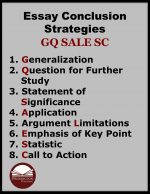
Conclusion Strategies
Check a related article on How to Teach the Essay Conclusion for a variety of conclusion strategies. Also, look at the targeted comments I’ve developed for all components of the essay, including conclusion paragraphs . They are the same kinds of comments you’d type up and program if you took the time to do so. Learn how to use these comments to respond to first or second drafts, and not just as summative comments on the final draft.
I’ve developed 438 of the most common comments teachers make to respond to student essays. Comments are categorized and given a simple alphanumeric code to access a downloaded comment.
e46 Needs Thesis Re-statement Essay conclusions traditionally begin with a thesis re-statement. Consider using a different grammatical sentence opener or opening transition word to avoid repetition.
e47 Needs Another Conclusion Strategy Use at least two conclusion strategies. Add a G eneralization, Q uestion for Further Study, Statement of S ignificance, A pplication, Argument L imitations, E mphasis of Key Point, S ummary Statement, or C all to Action. GQ SALE SC
e48 Needs a Different Conclusion Strategy Use a variety of conclusion strategies. Add a G eneralization, Q uestion for Further Study, Statement of S ignificance, A pplication, Argument L imitations, E mphasis of Key Point, S ummary Statement, or C all to Action. GQ SALE SC
e49 Needs a Finished Feeling A conclusion needs to provide a finished feeling for the reader. The conclusion must satisfy the reader that the purpose has been achieved or point of view has been convincingly argued.
As we all know, many of the same comments will apply to most students. How many times have we veteran English teachers written out this comment in an essay conclusion: “Don’t introduce new evidence in the conclusion” ? 1000? One smart solution would be to develop a bank of most-often used essay comments to help students revise all areas of the essay:
Introduction Paragraphs, Body Paragraphs: Argument, Analysis, Evidence, Conclusion Paragraphs, Coherence, Word Choice, Sentence Variety, Writing Style, Format, Textual Citations, Parts of Speech, Subjects and Predicates, Types of Sentences, Mechanics, and Conventional Spelling Rules
I’ve developed 438 of the most common comments teachers make to respond to student essays. Comments are categorized and given a simple alphanumeric code to

Essay Conclusion e-Comments
access a downloaded comment (See above examples). Using e-comments to insert into online student essays submitted on Microsoft Word or in Google Docs can save grading time and allow teachers be selective, prescriptive, and efficient. Of course, many teachers prefer to copy and paste these comments and then print off a comments for each student. Teachers can then hold students accountable for revision.
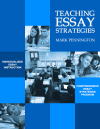
TEACHING ESSAYS BUNDLE
Works great in Microsoft Word and can be batch dumped easily into Google Docs. Nice for paper comments as well. The comments use the same, consistent language Common Core language of instruction. I’ve included this comment download in my TEACHING ESSAYS BUNDLE and The Pennington Manual of Style (a slice of the comprehensive essay program).
Writing attention grabbing openers , conclusions strategies , essay conclusions , essay hooks , essay introductions , essay strategies , essay worksheets , five paragraph essay , funnel paragraphs , how to write an essay , How to write an essay conclusion , Mark Pennington , Teaching Essay Strategies , thesis restatement , thesis statements , types of writing hooks , writing strategies , writing worksheets
- No comments yet.
- No trackbacks yet.
Links to Programs and Resources
- About the Author/Contact Us
- Free Reading/ELA Assessments
- Free Articles and Resources
- Testimonials
Join the SOR Literacy Hub - Resource Sharing FB Group
https://www.facebook.com/groups/sorliteracyhub
Recent Articles
- Phonics Lesson for Reading Intervention May 30, 2024
- Phonemic Awareness for Older Students May 29, 2024
- Free Science of Reading Lessons | ELL January 2, 2024
- Free Science of Reading Lessons | SPED January 2, 2024
- Free Science of Reading Lessons | High School January 2, 2024
- Free Science of Reading Lessons | Middle School January 2, 2024
- Free Science of Reading Lessons | Grade 6 January 2, 2024
- Free Science of Reading Lessons | Grade 5 January 2, 2024
- Free Science of Reading Lessons | Grade 4 January 2, 2024
- Reading Intervention Flow Chart December 19, 2023
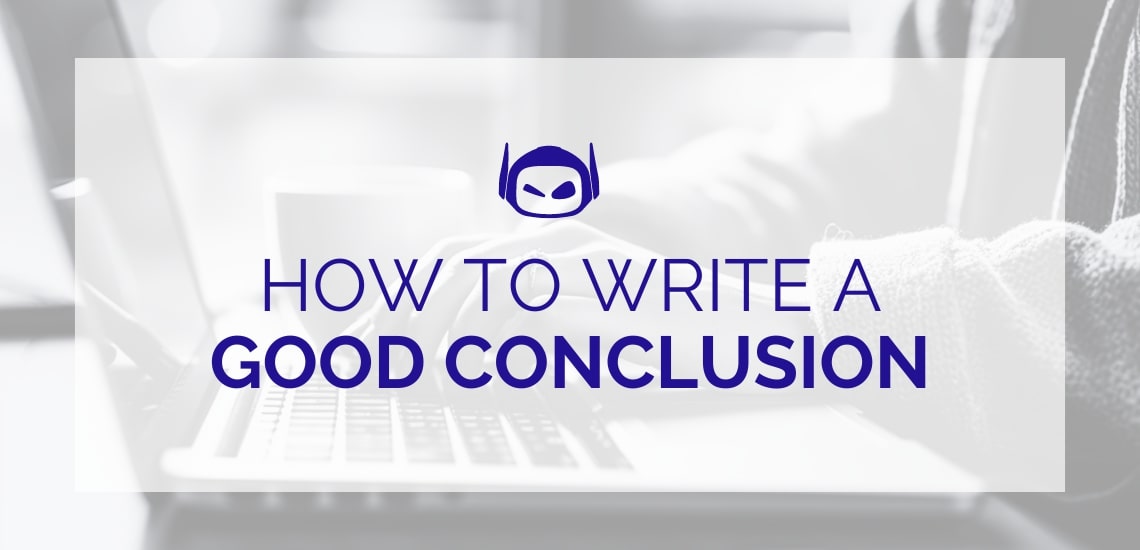
How to Write a Good Conclusion (With Examples)
- Smodin Editorial Team
- Published: May 31, 2024
Students often spend a great deal of time crafting essay introductions while leaving the conclusion as an afterthought. While the introduction is one of the most vital aspects of an essay, a good conclusion can have just as much of an impact on its effectiveness. Knowing how to write a good conclusion is crucial, as it encapsulates your main points and leaves a lasting impression on the reader.
A well-crafted conclusion should serve as the final pitch for your arguments. Your reader should walk away with a clear understanding of what they just read and how it applies to the core of your thesis. With the right approach, your conclusion can transform a good essay into a great one, making it both memorable and impactful.
This article will guide you through four simple steps of writing compelling conclusions. Each step is designed to help you reinforce your thesis and articulate your final thoughts in a way that will resonate with your teacher or professor. With a bit of practice, you can learn how to stick the landing and give every essay the finale it deserves.
What Is the Purpose of the Conclusion Paragraph?
Understanding the purpose of the conclusion paragraph is essential for effective essay writing. The conclusion paragraph should be more than just a summary of your essay. It should consolidate all your arguments and tie them back to your thesis.
Remember, all good writing inspires emotion. Whether to inspire, provoke, or engage is up to you, but the conclusion should always leave a lasting impression.
If in doubt, Smodin’s AI Chat tool can be handy for gauging the emotional impact of your conclusion.
By mastering the art of writing a powerful conclusion, you equip yourself with the tools to ensure your essays stand out. Whether it’s the first or last essay you’re writing for the class, it’s your chance to leave a definitive mark on your reader.
How to Write a Good Conclusion

This approach ensures your conclusion adds value and reinforces your arguments’ coherence. Here are three simple and effective practices to help you craft a solid conclusion.
Restating Your Thesis
Restating your thesis in the conclusion is a common practice in essay writing, and for good reason. It helps underscore how your understanding has deepened or shifted based on the evidence you provided.
Just understand that a restatement of your original thesis doesn’t mean a complete word-for-word repeat. You should rephrase your original thesis so that it elucidates the insights you touched on throughout the essay. Smodin’s AI Rewriter can help refine your restatement to ensure it is fresh and impactful.
Here are a few tips to effectively restate your thesis
- Show Complexity : If your essay added layers or nuances to the original statement, be sure to articulate that clearly.
- Integrate Key Findings : Incorporate the main findings of your essay to reinforce how they supported or refined your thesis.
- Keep It Fresh : Again, you want to avoid repeating the same things twice. Use different wording that reflects a nuanced perspective.
Finally, always ensure that the restated thesis connects seamlessly with the rest of your essay. Always try to showcase the coherence of your writing to provide the reader with a strong sense of closure.
Using AI tools like Smodin’s Outliner and Essay Writer can ensure your writing flows smoothly and is easy to follow.
Providing an Effective Synthesis
Providing an effective synthesis should enhance your original thesis. All good arguments should evolve and shift throughout the essay. Rather than simply summarizing these findings, you should integrate critical insights and evidence to demonstrate a deeper or more nuanced understanding.
Draw connections between the main points discussed and show how they collectively support your thesis. Also, reflect on the implications of these insights for the broader context of your subject. And once again, always use fresh and engaging language to maintain the reader’s interest.
The last thing you want is for your reader to view your essay as a collection of individual points. A good essay should read as a unified whole, with all the pieces tying together naturally. You affirm your argument’s significance when you tie all the pieces together in your conclusion.
Providing New Insights

Also, think of this step as your opportunity to propose future research directions based on your findings. What could a student or researcher study next? What unanswered questions remain? If you’re having trouble answering these questions, consider using Smodin’s research tools to expand your knowledge of the topic.
That isn’t to say you can leave open-ended or unanswered questions about your own thesis. On the contrary, your conclusion should firmly establish the validity of your argument. That said, any deep and insightful analysis naturally leads to further exploration. Draw attention to these potential areas of inquiry.
(Optional) Form a Personal Connection With the Reader
Forming a connection with the reader in the conclusion can personalize and strengthen the impact of your essay. This technique can be powerful if implemented correctly, making your writing more relatable, human, and memorable.
That said, slime academics discourage using “I” in formal essays. It’s always best to clarify your teacher’s or professor’s stance before submitting your final draft.
If it is allowed, consider sharing a brief personal reflection or anecdote that ties back to the main themes of your essay. A personal touch can go a long way toward humanizing your arguments and creating a connection with the reader.
Whatever you choose, remember that your conclusion should always complement the analytical findings of your essay. Never say anything that detracts from your thesis or the findings you presented.
Examples of Good Conclusions
Let’s explore some examples to illustrate what a well-crafted conclusion looks and sounds like. The following are two hypothetical thesis essays from the fields of science and literature.
- Thesis Topic: The Impact of Climate Change on Coral Reefs
- Introduction: “Coral reefs act as the guardians of the ocean’s biodiversity. These underwater ecosystems are among the most vibrant and essential on the entire planet. However, the escalating impact of climate change poses a severe threat to their health and survival. This essay aims to dissect specific environmental changes contributing to coral degradation while proposing measures for mitigation.”
- Conclusion: “This investigation into the impact of climate change on coral reefs has revealed a disturbing acceleration of coral bleaching events and a significant decline of reef biodiversity. The findings presented in this study establish a clear link between increased sea temperatures and coral reef mortality. Future research should focus on the resilience mechanisms of coral species that could influence conservation strategies. The fate of the coral reefs depends on humanity’s immediate and concentrated action to curb global emissions and preserve these vital ecosystems for future generations.”
Notice how the conclusion doesn’t simply restate the thesis. Instead, it highlights the definitive connection between climate change and coral health. It also reiterates the issue’s urgency and extends a call of action for ongoing intervention. The last sentence is direct, to the point, and leaves a lasting impression on the reader.
If you’re struggling with your closing sentence (or any sentence, for that matter), Smodin’s Rewriter can create hundreds of different sentences in seconds. Then, choose the sentences and phrases that resonate the most and use them to craft a compelling conclusion.
- Thesis Topic: The Evolution of the American Dream in 20th-Century American Literature
- Introduction: “The American Dream was once defined by prosperity and success. However, throughout the 20th century, the representation of the American Dream in popular literature has undergone significant changes. Are these representations indicative of a far-reaching sentiment that lay dormant among the American public? Or were these works simply the result of disillusioned writers responding to the evolving challenges of the times?”
- Conclusion: “Works by F. Scott Fitzgerald, John Steinbeck, and Toni Morrison illustrate the American Dream’s evolution from unbridled optimism to a more critical examination of the American ethos. Throughout modernist and post-modernist literature, the American Dream is often at odds with core American values. These novels reflect broader societal shifts that continue to shape the national consciousness. Further research into contemporary literature could provide greater insight into the complexities of this concept.”
You will know exactly what this essay covers by reading the introduction and conclusion alone. It summarizes the evolution of the American Dream by examining the works of three unique authors. It then analyzes these works to demonstrate how they reflect broader societal shifts. The conclusion works as both a capstone and a bridge to set the stage for future inquiries.
Write Better Conclusions With Smodin
Always remember the human element behind the grading process when crafting your essay. Your teachers or professors are human and have likely spent countless hours reviewing essays on similar topics. The grading process can be long and exhaustive. Your conclusion should aim to make their task easier, not harder.
A well-crafted conclusion serves as the final piece to your argument. It should recap the critical insights discussed above while shedding new light on the topic. By including innovative elements and insightful observations, your conclusion will help your essay stand out from the crowd.
Make sure your essay ends on a high note to maximize your chances of getting a better grade now and in the future. Smodin’s comprehensive suite of AI tools can help you enhance every aspect of your essay writing. From initial research to structuring, these tools can streamline the process and improve the quality of your essays.
A complete guide to writing concluding remarks effectively in essay writing
Description.
Academic writing plays a vital role in grooming a student's personality in several ways. It has great significance in all educational institutes. They think that writing a detailed essay is a tiresome job. Students look forward to asking others to write my essay as they consider it the best option to complete the assigned task.
Expressing thoughts, ideas, and feelings significantly is not an easy job to do. For this purpose, a student must have sufficient writing skills and profound knowledge about the topic.
It is suggested for all neophyte writers that they must give high priority to their readers by making the writing content interesting, exciting, and informative instead of writing vague and naïve content.
Furthermore, a student must know the art of summarizing the whole discussion of the essay in a fruitful way. If a student fails to do so, he will ruin all his writing efforts in expressing his thoughts, telling his opinion, and stating the robust thesis statement.
An academic essay is composed of three parts, which, when combined, forms a perfect structure. This structure is a predefined one, and following it strictly is the utmost responsibility of a student.
Some students struggle a lot in getting top-grades despite hiring an essay writing services and in-depth knowledge about the assigned statement. It happens when they don't wind up the whole discussion in a persuasive way in the conclusion section.
The concluding remarks must be up to the mark, cogent, and convincing for the readers so that they can find the whole essay worth reading. This section also demands a student to clearly state his particular position by restating the thesis statement in a unique and significant way.
Moreover, it also must address all the ambiguities, queries, and questions a reader may have in his mind. The final remarks must be precise and must not leave any question in the reader's mind.
It is also notable that sometimes while writing a comprehensive essay, students make a common mistake of introducing a new idea or thought in the conclusion section. Don't ever make this mistake as it devastates the effort of writing a comprehensive essay.
However, a student can recommend or suggest something creative, which must be strongly relevant to the thesis statement.
This particular section has its unique rules, which make it distinct and unique from other parts of essay writing.
It is a section where essay writer has to emphasize the main idea and encourages a student to synthesize his thoughts in a stunning way.
Some students consider essay writing a daunting and disconcerting affair, while it is not entirely the case. Such students lack writing skills and never give importance to brainstorming.
It is imperative to mention here that all students must learn the essay writing tips and rules as it is the last resort for them. They have to write a large number of essays throughout their academic careers, so they must learn to write top-notch and handy essays instead of asking others to write essays for them time and again.
Essay writing has become an essential subject in all types of degree program, you can also hire an essay typer for this task. So, students must give high importance to raise their writing skills and practice writing different types of essays on a daily basis.
Useful Resources:
https://rickeyclarke01.gitbook.io/complete-guide-to-writing-an-paragraph-in-argument/ https://note.com/rickeyclarke/n/n41fd98b22859 https://rickeyclarke.cocolog-nifty.com/blog/2020/07/post-6b930e.html
Leave a comment
Organizer contact.
Academic Writing
Michael Peterson
Address : Edwards Street New York New York 10001 UNITED STATES
Phone : 2025550159
Your message was successfully sent to the organizer.
An error occurred while sending your message. please try to send it again..

- See the Terms of Sale

Closing Remarks for Speech
Ai generator.
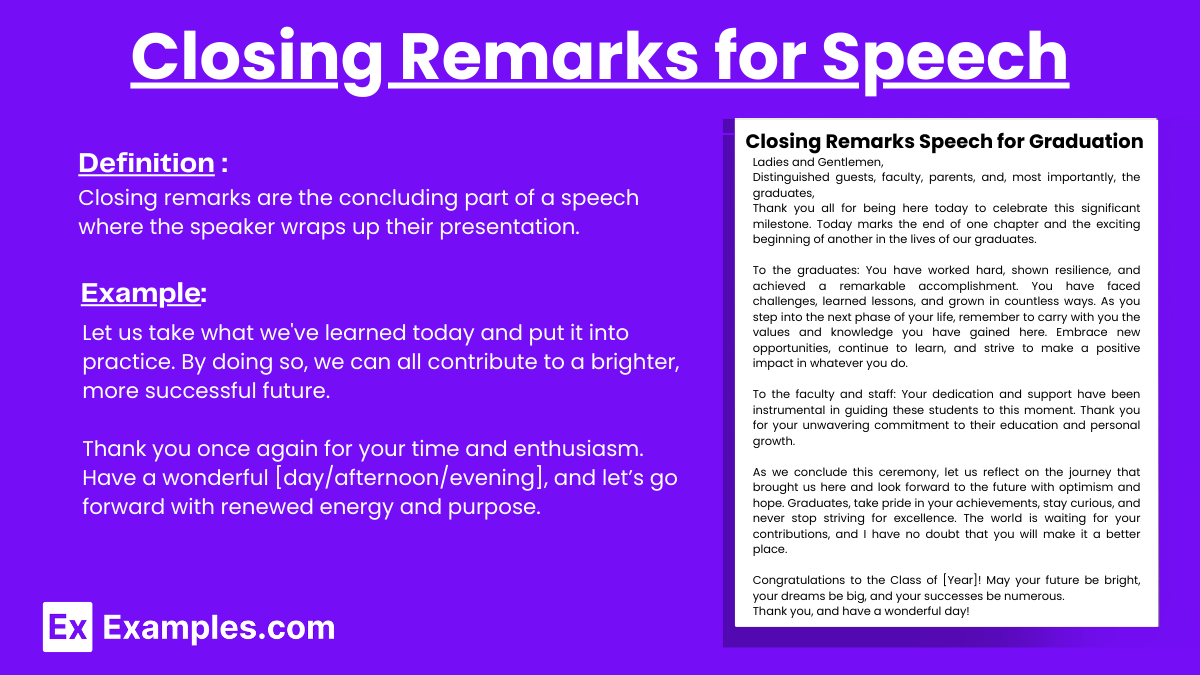
Closing remarks are the concluding part of a Speech where the speaker wraps up their presentation. This section typically summarizes the key points discussed, reinforces the main message, and leaves the audience with a final thought or call to action. Closing remarks are important as they provide a sense of closure and can have a lasting impact on the audience.
What is Closing Remarks for Speech?
Closing remarks are the final statements in a speech, where the speaker brings everything to a conclusion. This part of the speech is designed to recap the main points, emphasize the central message, and offer a final takeaway for the audience. It ensures that the speech ends on a strong note, leaving a lasting impression on the listeners.
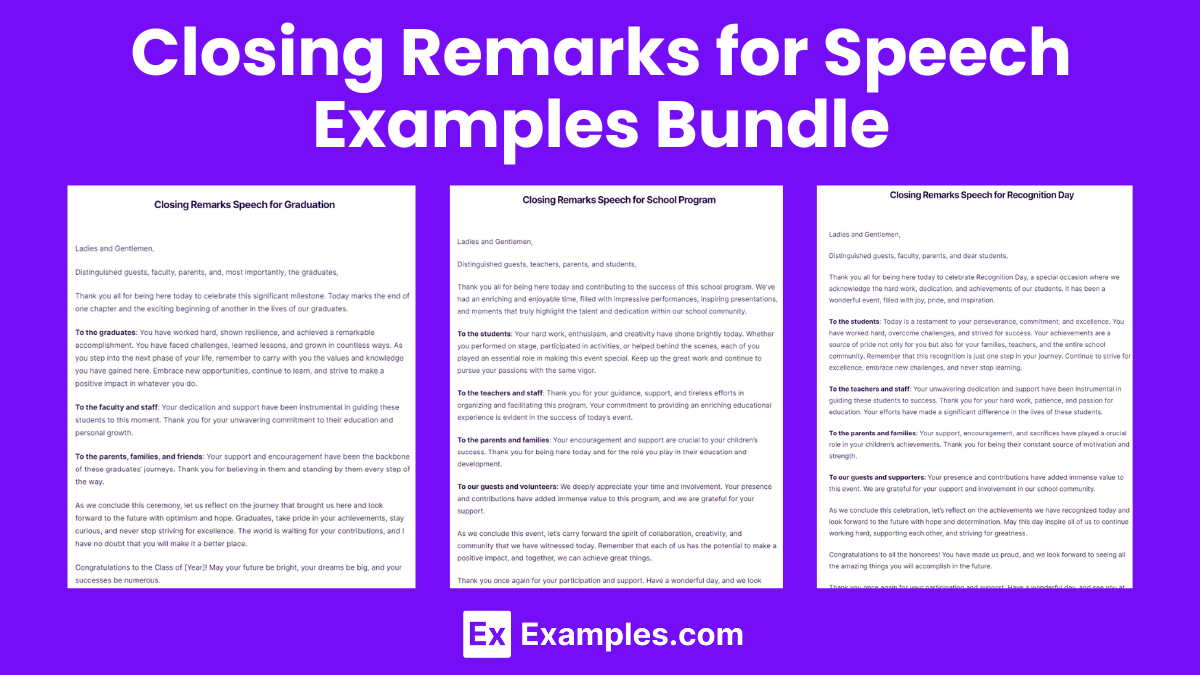
Closing Remarks for Speech Bundle Download
Closing Remarks for Speech Format
1. summarize key points.
Briefly recap the main ideas or arguments presented in your speech. Example : “Today, we discussed the importance of time management, practical strategies to implement it, and the benefits it brings.”
2. Reinforce the Main Message
Emphasize the core message or takeaway you want the audience to remember. Example: “Remember, effective time management is crucial for reducing stress, increasing productivity, and achieving your goals.”
3. Call to Action
Encourage the audience to take specific actions or steps based on your speech. Example: “I encourage each of you to start using a planner, set specific goals, and tackle your most important tasks first.”
4. Thank the Audience
Express gratitude for their time and attention. Example: “Thank you all for your attention and engagement today.”
5. End with a Memorable Closing
Finish with a powerful quote, a thought-provoking statement, or an inspiring note. Example: “As the saying goes, ‘The bad news is time flies. The good news is you’re the pilot.’ Make the most of your time and steer your life towards success.”
Closing Remarks for Speech Example
Today, we’ve explored the importance of effective time management, discussed practical strategies to implement it, and highlighted the numerous benefits it brings. Remember, managing your time well is crucial for reducing stress, increasing productivity, and achieving your goals. I encourage each of you to start using a planner, set specific goals, and tackle your most important tasks first. By doing so, you will take control of your time and pave the way for a more balanced and successful life. Thank you all for your attention and engagement today. As the saying goes, “The bad news is time flies. The good news is you’re the pilot.” Make the most of your time and steer your life towards success. Thank you!

Short Closing Remarks for Speech Example
Today, we explored the importance of effective time management and practical strategies to achieve it. Remember, managing your time well reduces stress, increases productivity, and helps you reach your goals. I encourage you to start using a planner, set specific goals, and tackle your most important tasks first. Thank you for your attention. As the saying goes, “The bad news is time flies. The good news is you’re the pilot.” Make the most of your time and steer your life towards success. Thank you!
Closing Remarks for Speech for Graduation
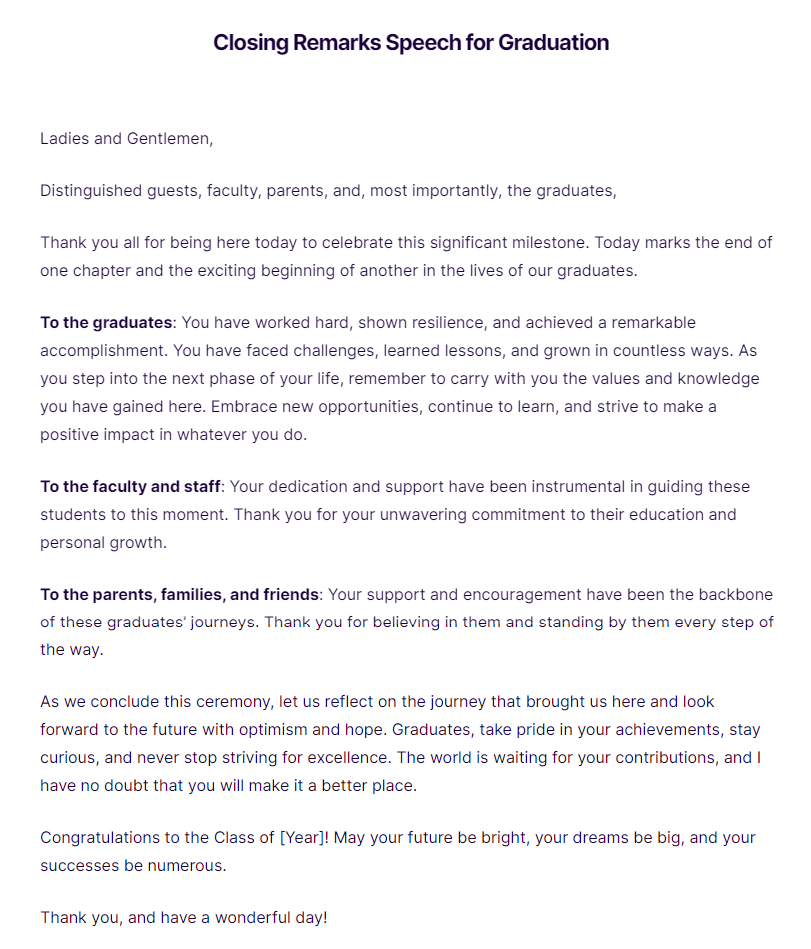
Closing Remarks for Speech for School Program
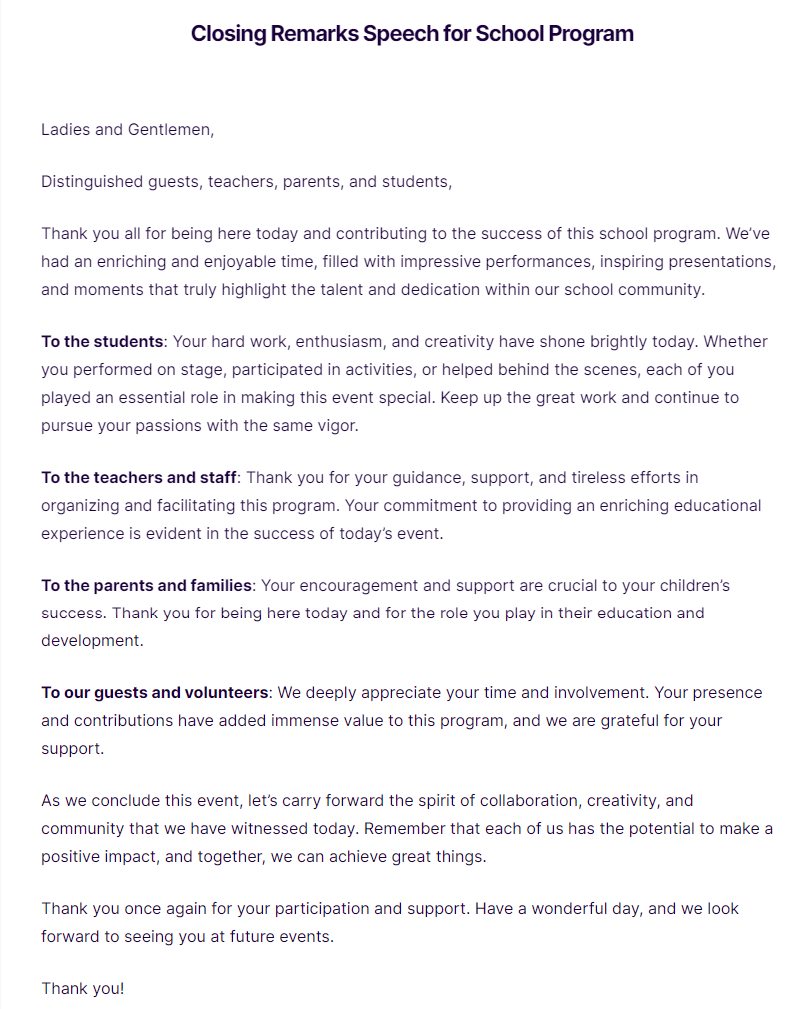
Closing Remarks for Speech for Recognition Day
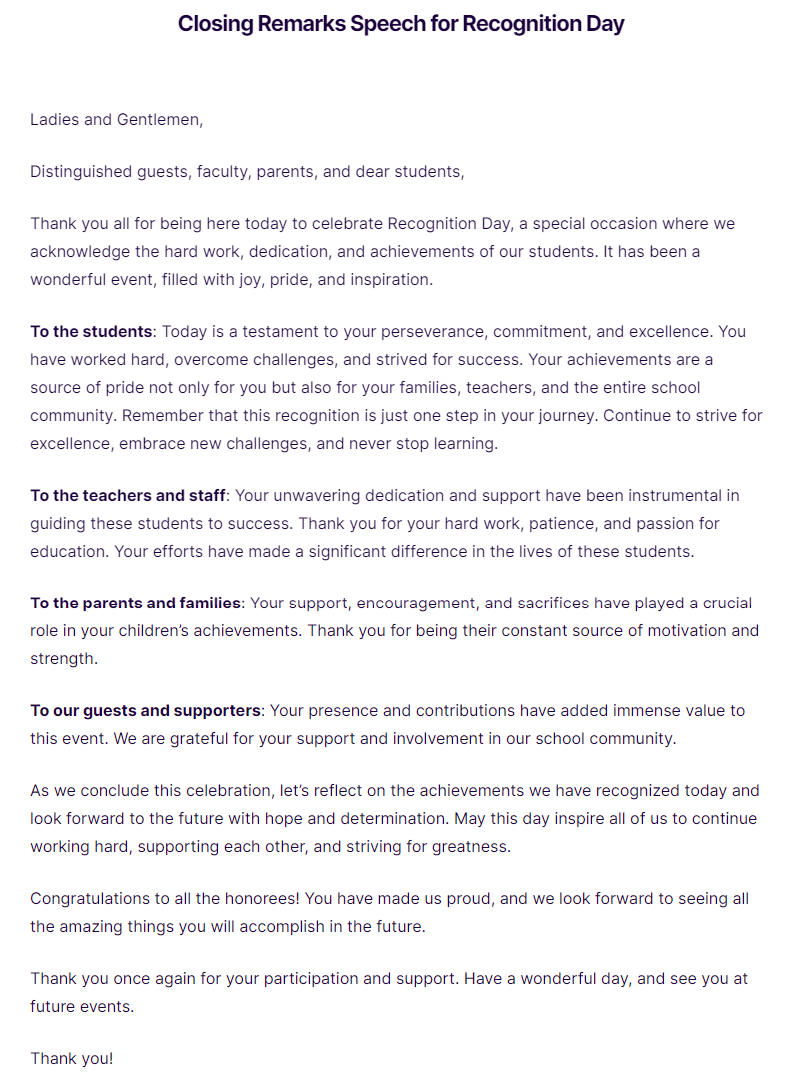
More Closing Remarks for Speech Topics
- Closing Remarks Speech for an Event
- Closing Remarks Speech for Seminar
- Closing Remarks Speech for Teachers Day
- Closing Remarks Speech for Christmas Party
- Closing Remarks Speech for Valedictorian
- Closing Remarks for Speech Contest
- Closing Remarks Speech for Wedding
- Closing Remarks Speech for Conference
- Closing Remarks Speech for Award Ceremony
- Closing Remarks Speech for Farewell
- Closing Remarks Speech for Workshop
- Closing Remarks Speech for Business Meeting
- Closing Remarks Speech for Retirement
- Closing Remarks Speech for Fundraiser
- Closing Remarks Speech for Community Event
- Closing Remarks Speech for Gala
- Closing Remarks Speech for Annual General Meeting
- Closing Remarks Speech for Orientation
- Closing Remarks Speech for Leadership Summit
- Closing Remarks Speech for Charity Event
- Closing Remarks Speech for Memorial Service
- Closing Remarks Speech for Family Reunion
- Closing Remarks Speech for Corporate Event
- Closing Remarks Speech for Product Launch
- Closing Remarks Speech for Training Session
- Closing Remarks Speech for Cultural Festival
- Closing Remarks Speech for Political Rally
How to Write Closing Remarks for Speech
Briefly recap the main ideas or arguments presented.
Example: “Today, we discussed the importance of time management, practical strategies to implement it, and the benefits it brings.”
Emphasize the core message or takeaway you want the audience to remember.
Example: “Remember, effective time management is crucial for reducing stress and achieving your goals.”
Encourage the audience to take specific actions based on your speech.
Example: “I encourage you to start using a planner and prioritize your tasks.”
Express gratitude for their time and attention.
Example: “Thank you all for your attention.”
Finish with a powerful quote, a thought-provoking statement, or an inspiring note.
Example: “As the saying goes, ‘The bad news is time flies. The good news is you’re the pilot.’ Make the most of your time.”
Tips to Deliver Closing Remarks for Speech
1. Summarize Key Points : Briefly recap the main ideas discussed in your speech.
2. Reinforce the Main Message : Emphasize the core message you want the audience to remember.
3. Call to Action : Encourage the audience to take specific steps or actions based on your speech.
4. Express Gratitude : Thank the audience for their time and attention.
5. End with a Memorable Closing : Finish with a powerful quote, thought-provoking statement, or inspiring note.
Why are closing remarks important?
They reinforce the message, ensure audience retention, and provide a clear, memorable conclusion.
How should I structure closing remarks?
Summarize key points, thank the audience, and end with a powerful, memorable statement or call to action.
Can I include a quote in my closing remarks?
Yes, a relevant and impactful quote can effectively reinforce your message and leave a lasting impression.
What should I avoid in closing remarks?
Avoid introducing new information, being too lengthy, or ending abruptly without a clear conclusion.
How do I make my closing remarks engaging?
Use a strong, positive tone, include a personal touch or story, and connect emotionally with the audience.
Can humor be part of closing remarks?
Yes, appropriate humor can leave a positive impression and end your speech on a high note.
How long should closing remarks be?
Closing remarks should be concise, typically lasting no more than a few minutes.
What is a call to action in closing remarks?
A call to action urges the audience to take specific steps or actions related to your speech’s message.
Should I thank the audience in my closing remarks?
Yes, thanking the audience shows appreciation and fosters a positive connection.
Can I use a rhetorical question in my closing remarks?
Yes, a rhetorical question can provoke thought and leave the audience reflecting on your message.
Text prompt
- Instructive
- Professional
10 Examples of Public speaking
20 Examples of Gas lighting

Key Tips for Sample Closing Remarks in a Meeting

"The art of communication is the language of leadership," James Humes once remarked, highlighting how our words can shape our actions and outcomes.
In the world of meetings, the final words you choose can have a profound impact, much like the last brush stroke that completes a painting.
Effective closing remarks not only signal the end of a meeting but also reinforce the topics discussed and set the stage for future interactions.
But how can we make sure that our final words have a major impact?
In this post, you will learn how to make your concluding remarks memorable, instill a sense of achievement in all participants, and prepare them for future challenges and opportunities.
Whether you are closing up a routine team check-in or a high-stakes board meeting, the methods presented here will help you make each meeting memorable and productive.

Key Takeaways
- Understand the importance of writing compelling sample closing remarks for meetings.
- Understand the complexities of summarizing a meeting agenda so that the focus shifts to action.
- Discover the significance of closing on a note that ensures a lasting impact, preparing attendees for the next meeting.
- Learn the importance of reinforcing the objectives and key takeaways at the end of your speech.
- Discover best practices for concluding gatherings that transform ordinary meetings into extraordinarily productive meetings.
The Art of Making Memorable Closing Remarks
As your meeting comes to an end, leaving a lasting impression depends on summarizing the main points well. It's key to repeat the important messages to make sure they stick. Doing this will not only leave a positive note but also prepare everyone for next time.
Ending your meeting well can help make it a success. It boosts enthusiasm for the best effort in concrete actions after the meeting.
Making sure actionable items are part of your agenda is a top tip. This means listing concrete actions and when they're due. It ensures that everyone understands their next steps and acknowledges their efforts.
- Recap the main points and key messages
- Address unresolved issues and schedule follow-up.
- Assign concrete actions and define due dates
- Provide special thanks to attendees and contributors
Asking for feedback is also important. It demonstrates that you value everyone's input and strive for better meetings in the future.
Quote for Inspiration: As you conclude the meeting, offer an encouraging quote that relates to the meeting's theme or the progress made. Helen Keller's words, ' Alone, we can do so little; together, we can do so much,' highlight the value of collaboration and collective effort. This not only leaves attendees inspired but also firmly plants the seeds of motivation and reflection as they leave the room.
When you thank everyone and acknowledge their contributions, you leave a lasting impression. This helps keep the team motivated for the next steps.

Remember, great closing remarks are about inspiration, recognition, clarity, and looking forward. These elements don't just end the meeting. They set everyone on the right path to success.
Incorporating Gratitude and Recognition into Your Closing Speech
How you sign off in corporate and organizational meetings is key. Expressing gratitude as you end a meeting is vital. It leaves a memorable impact, promotes unity, and sets the stage for future successes.

Expressing Sincere Thanks and Appreciation
At the end of your meeting, saying thanks is more than just good manners. It builds positive ties and boosts teamwork. It's essential, whether thanking your local team or global partners, to express your appreciation genuinely.
Example : "I would like to express my sincere appreciation to the marketing team, in particular, for the efficient launch of our novel product a month ago. Your creativity and commitment were critical to exceeding our sales targets."
Acknowledging Contributions and Hard Work
It is imperative to show respect and recognition to individuals who exceed expectations and surpass the norm. Acknowledging every team member's efforts shows that every action counts. This recognition emphasizes collective goals and the journey to achieving them together.
Example : "Let us remember the events of last week, when Eva, a member of the client services team, successfully fixed the issue that had been raised. In addition to ensuring our most important client's retention, her collected and systematic demeanor provided us with invaluable insights into consumer engagement."
Highlighting Achievements and Milestones
Celebrating successes keeps the team motivated. It shines a light on the progress made, such as gender equality efforts and sustainable development goals. Recognizing these achievements inspires current projects and future ambitions.
Example : "As we celebrate the accomplishments of the present day, let us also anticipate the prospects and difficulties that lie ahead in the coming year. Collectively, we are setting the stage to not only achieve but also exceed our yearly objectives."
Concluding your meeting successfully may serve as motivation for future accomplishments or result in a sense of unfinished business.
Ensure that you express genuine gratitude, praise the labor of all people, and highlight your accomplishments.
This way, you end on a high note, motivating everyone for what's ahead.
Example Closing Remarks for a Meeting
1. Introduction and Overview : "Good afternoon, everyone. Before we finish today, let us reflect on the most recent developments we discussed. These advancements position us well for the coming year. I believe we have identified some excellent concepts that point us in the right direction."
2. Highlighting Regional Integration: "Today, we have faced enormous challenges, particularly in the area of regional integration. For example, our debate about how to streamline cross-border trade laws within the EU has been extremely insightful. It is apparent that we are taking steps toward more seamless economic cooperation."
3. Inspiration from Global Environmental Initiatives: "The Italian government's measures to increase renewable energy use serve as a persuasive example for all of us. Secretary General Guterres' recent speech at the Climate Action Summit, emphasizing the urgent need for global partnerships to combat climate change, encourages and galvanizes us. These instances of leadership demonstrate the value of proactive policy and international cooperation. Reflecting on our talks, we see there's much to do, but we're ready to face it."
4. Reflecting on Progress and Challenges: "Reflecting on the talks we had today, there is certainly a lot to do, but I am optimistic." Despite the recent advancements and intense conversations on regional integration, there is still a significant amount of work to accomplish. However, with our continuing efforts and adherence to these ideals, we remain optimistic about overcoming any obstacles."
5. Future Directions and Innovation: "Looking ahead, let's capitalize on the momentum we've created. Our next measures should involve boosting our visibility on social media and other digital venues to promote our objectives. Don't forget that innovation is just around the corner. With projects like the imminent launch of our digital marketplace, we're taking big steps toward new solutions and tactics."
6. Conclusion and Call to Action: "In conclusion, today's session not only tackled important matters but also established the foundation for significant action. Today's hard work and collaboration drive our innovation for a brighter future. Thank you for your active participation and insights. Until next time, let us continue to share outstanding ideas, knowing that today's efforts benefit all of our tomorrows."

Ending a meeting well is an art that leaves a lasting impact. It instills a sense of value in the time we spend together. You not only end on a high note, but you also set your team up for future success by picking the right closing words.
It's crucial to take the main points discussed and turn them into actions that push the team's goals forward. Clear action items and defined due dates are essential for efficiently wrapping up meetings and ensuring everyone understands their next steps.
Following up with a meeting summary through the most effective channels helps keep everyone on the same page, turning the meeting's energy into tangible results. This proactive approach not only clears up any confusion but also reinforces the discussions and decisions.
The way you end today's meeting affects future ones. Use this moment to demonstrate how to capture and foster a culture of growth and creativity.
You have the ability to change meetings into opportunities for actual development rather than just routines. It's about telling a story that wraps up today's meeting and gets people excited for the next one.
Now that you've learned how to make effective closing remarks, it's time to put them into action. Use these methods at your next meeting to make a lasting impact that inspires and unifies your team.
Don't keep these thoughts to yourself; share this piece with colleagues and friends who run meetings!
Together, you can turn your findings into unforgettable moments that pave the road for future success.
What are some key elements of sample closing remarks for a meeting?
Closing remarks should briefly summarize main points and outline next steps. Action items and due dates should be clear. The goal is to make a memorable impact, keeping the meeting's purpose in focus.
How can I ensure my closing remarks are memorable and effective?
To leave a lasting impression, end on a high note, maybe with an inspiring quote. Be clear in your key messages and define next steps. Using precise language ensures the core of the meeting stays with attendees.
Why is expressing gratitude important in the closing remarks of a meeting?
Gratitude shows appreciation for everyone's hard work. It fosters a team spirit and strengthens relationships. Recognizing each member's effort shows their contributions are valued.
What's a good way to acknowledge participants' contributions during a meeting?
Acknowledge contributions with special thanks in your closing remarks. Highlight examples of effort and participation. Celebrating collective achievements, like tackling gender equality and pushing for sustainable growth, adds value.
Can you provide a sample structure for closing remarks that discuss the latest developments?
Begin with a greeting, then praise the group's work on recent developments. Discuss how these developments impact future actions. Include topics like regional integration and climate change for depth.
How do I end my meeting on the right note?
Sum up key points and confirm next actions to wrap up positively. Ending with an uplifting note encourages further reflection. Look forward to the next meeting for ongoing progress. A recap after the meeting helps solidify the discussion.

IMAGES
VIDEO
COMMENTS
The conclusion is the final paragraph of your essay. A strong conclusion aims to: Tie together the essay’s main points; Show why your argument matters; Leave the reader with a strong impression; Your conclusion should give a sense of closure and completion to your argument, but also show what new questions or possibilities it has opened up.
A concluding remark is the last sentence of the conclusion in an essay. It is called a concluding remark because it sums up the entire purpose of the essay in a single sentence. As the name suggests, this remark wraps up the entire essay with a period at the end.
To close the discussion without closing it off, you might do one or more of the following: Conclude with a quotation from or reference to a primary or secondary source, one that amplifies your main point or puts it in a different perspective.
Conclusion Strategies. Check a related article on How to Teach the Essay Conclusion for a variety of conclusion strategies. Also, look at the targeted comments I’ve developed for all components of the essay, including conclusion paragraphs.
The conclusion paragraph should be more than just a summary of your essay. It should consolidate all your arguments and tie them back to your thesis. Remember, all good writing inspires emotion. Whether to inspire, provoke, or engage is up to you, but the conclusion should always leave a lasting impression.
The concluding remarks must be up to the mark, cogent, and convincing for the readers so that they can find the whole essay worth reading. This section also demands a student to clearly state his particular position by restating the thesis statement in a unique and significant way.
4. Thank the Audience. Express gratitude for their time and attention. Example: “Thank you all for your attention and engagement today.”. 5. End with a Memorable Closing. Finish with a powerful quote, a thought-provoking statement, or an inspiring note. Example: “As the saying goes, ‘The bad news is time flies.
The closing paragraph is the cincher in your college application's personal statement. Find out how to make the most of your important last words and seal the deal with your dream school.
Understand the importance of writing compelling sample closing remarks for meetings. Understand the complexities of summarizing a meeting agenda so that the focus shifts to action. Discover the significance of closing on a note that ensures a lasting impact, preparing attendees for the next meeting.
Closing Remarks In the novel To Kill a Mockingbird by Harper Lee, Atticus Finch, the main character's father makes his closing remarks to the jury before they decide Tom Robinson's fate. In Atticus's summation speech he uses four literary devices in an attempt to make an effective speech to the jury which are diction, syntax, imagery, and irony ...